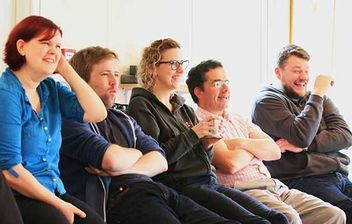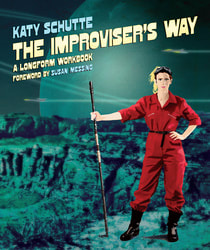 There are many improv styles and groups in the world and each has it’s own relationship with female characters and players. From my many encounters, here are some things that I think we can do as women for women to help us all have a super time on stage. And by women, I mean those who identify as such. Help other women be heard Women in Obama’s Administration found that they could help one another be heard and acknowledged by ‘amplification’. Rather than being talked over or having their ideas claimed and reframed, they would repeat and credit one another’s ideas until they were taken on board by the other players. Validate other women’s choices We have learned ‘yes, and’ and you can push it even further with super agreement. If an idea is crazy or something doesn’t make sense, you can always justify it or reframe it in a way that makes your lady friend look like a hero. Instead of asking her to clarify or expecting her to fix it, help her out. Write better parts for women You are the writer of this improv show. Right now. You can pen the most perfect dialogue and strong, interesting, three-dimensional characters; no matter how they are framed. Get away from generic and make your ‘wife, mother, whore’ specific as all hell and probably a part-time scientist too… Be quick to be slow Sometimes the alpha in the room worries that you don’t have ideas or can’t make quick choices. Perhaps you’re the kind of player that likes character, emotion and subtext, which many need a second to form. That’s fine; start dynamically as if to say ‘I got this’ and then take your sweet time. Play men you know We have to pay it back too. Sick of men playing women by miming long hair, cupping their boobs and affecting a high voice? Let’s not do the same back. Cut out the ball scratching and instead play a man you know in real life. You know how he would be in this situation and then none of us are playing in broad strokes, we’re playing in nuance. A full character is not an accent, so why should they be a gender? Challenge your own bias You need to be a fire-fighter, astronaut or pirate on stage? Choose to play a female one. We have more female doctors than male, yet they’re often the male in a scene. Change it up. Bechdel counts Play named female characters in a scene that talk to one another about something other than a man. Peace.
476 Comments
 Image by Damian Robertson Image by Damian Robertson Every improv theatre I know has been making a policy on Sexual Harassment to protect their students, teachers and actors; perhaps it’s time to look at our key improv teachings and reinvent or rephrase them. When I started out in improv, Yes And was the first thing I learned (plus Listening and Commitment). I learned that no matter what was offered me in an improv scene, I should agree with it and add some detail to what was already being offered. Not only that but even if I felt uncomfortable, I should commit to the idea and make it look good. When we ask someone to ‘read that poem you’ve been working on’ or ‘do that dance’ we call it Pimping. Pimping is making someone do something they are likely uncomfortable with for the audience to enjoy. But now consent is front and centre of our work and in retrospect, both Yes And and Pimping feel a little icky. At the beginning Yes And was literal. We joke about improv being a cult, but perhaps asking people to agree with whatever is suggested has something a little brain-washy inside of it. More and more I find myself ditching Yes And in favour of ‘agree with the reality’. And that means making personal choices in the setting your partner has suggested. You’re chained to a sex dungeon wall and not cool with it? Great. Have magic powers to melt your chains and destroy your captor. You are told to read a poem out loud. Read it in a made up language or pass it right back for them to read. Someone on stage is asked to do a silly dance and they look mortified; edit the scene. Discomfort is often part of comedy and I like to live inside of it a lot of the time. I trust my teams and I don’t have many boundaries with them. However, I’ve seen too many improv jams where one inexperienced player (not always a man) is demanding sexual favours from their scene partner and fully expecting a Yes And. It won’t work in real life, but perhaps with our improv programming of Yes And, it will on stage? I know more than one person who quit learning improv because they kept getting creeped on in scenes. We put caveats in there, we step in as teachers to make sure everyone is happy, we watch out for the sexual predators, but perhaps that isn’t enough. What if the coach, director or teacher doesn’t get it and pushes you to play the improv rules? Only the other day I heard about a scene where one man screamingly sex-shamed a woman and the teacher declared that the scene was hilarious without checking in with the female player at all. In fact, after a student offered their feminist opinion on the scene, the inappropriateness was put to a vote! After years of improv I know that it’s fine to make ‘today the day’ when I decide not to be your sex slave anymore and leave this awful place. I know that choosing not to simul-fuck you is 100% in my arsenal and saying (in character) I’m not cool with this is a great character and scene choice that can lead to brilliant improv. I’m not saying this because I want all improv to be vanilla, far from it. Some of my favourite shows have been full of taboo. I’m saying this because With Great Power… If someone wants you to suck their dick in a scene and you think it will be fun or funny, fuck yes, do it! If you think it feels gross and weird and you feel you have to because rules: don’t. Find a fucking awesome reason why in this same reality you just aren’t going to and then make a brilliant other offer that moves the scene on. If you’re on the sides and you see a choice that traps someone because they feel they have to Yes And, edit them. After shows, tell people if you found something uncomfortable. Ask others if your weirdo move was okay. This is not to shut you down but to make you go further. I’ve been pimped to do a billion embarrassing or intimate things on stage. Sometimes I think it’s funny or good and I want to and other times it’s creepy or un-useful and I don’t want to. If it’s my ego or dignity or I’m just scared I’ll do it anyway and if it feels deeper than that, I’ll shut it down in a beautiful way that the audience won’t even see as a closer. I’m not hedging or editing or auditioning the scene, I’m enjoying my own boundaries and Yes And-ing myself. Side-note: I saw a show at a European improv festival where (after some character establishment) a male improviser stepped forward and asked which of the men she should choose to be with. As they were both (unintentionally) horrific characters and I was given the opportunity to voice my choice, I boldly declared ‘NEITHER’. I don’t know if I was the first, but certainly the rest of the audience rallied and shortly much of the room was bawling ‘BE YOUR OWN WOMAN’ and so forth. Looking a little shell-shocked, the male improviser returned to the narrative. I was excited to see what would happen. The lady forwarded her solo story, only to find that - driven by the male narrators - the ending was that she was ‘sad and alone in the middle of the woods for the rest of her life’. FFS. Even the audience can make choices. Yes And doesn’t have to be literal.  The Maydays in Happily Never After The Maydays in Happily Never After There are lots of different styles and forms of improvisation (as you already know) and one of those is telling a linear story. I’m certainly not the voice of narrative improv, being more Del Close in my schooling than Keith Johnstone, but I love and use narrative in some of the shows I perform. Without getting too bogged down in the Hero’s Journey and hitting story structure hard, you can use simple approaches in your improv show to create a narrative where you aren’t furiously trying to remember a lot of information or awkwardly struggling to tie everything up in the last five minutes. 1. Tell one story It’s very tempting to have an A, B and sometimes a C story when you get excited. You can enjoy other characters you meet along the way without having to tell their individual stories too. 2. Make or discover your protagonist The easiest way to keep it simple and tell one story is to make a that story fits around one character. Make it very clear who that character is and follow them. Maybe put them in every scene just to be sure. 3. Find a want for your protagonist An emotional need gives us a very clear route through any story. Even if it's a physical object they want, there will be an emotional reason for the desire. What they are searching for will lead them to people and places. 4. Do it now It feels like it would be fun to save the Prom or the Explosion or Getting the Diamond for the end of the show, but why do filler for 40 minutes and hope everyone else is on the same page for the ending? Do it now. Have the Prom in scene two and see what happens afterwards. 5. Be super obvious To avoid confusion, state what you think is true and what you think is going on. If this is your father, call him Dad a lot, if this lady seems mean; tell her that she seems really mean. Keeping secrets or being subtle about an idea will have people drawing different conclusions. 6. Start recycling half way through Once you hit the halfway point in your story you don’t need to add anything else. Pick up any character, location, object or idea that has already been mentioned and use it again. Think of your story in the shape of a diamond; wider, wider, wider, then halfway through you make it narrower again until it all ends in one point. 7. Weird shit will happen anyway You’re improvising, not writing, so some odd things will happen in your story even if you try hard to stop them. You really don’t need to work hard to put in strange and interesting ideas. Be obvious. Do the next most obvious thing and justify oddness when it arises organically. 8. Let it go The story may well go in a completely different direction than you thought it might. That is GREAT. Improv is art by committee; making a collective story that any one of you couldn’t have written on your own. Relax and enjoy the new journey rather than forcing your own story agenda. Good luck and thanks for reading! If you do want to get nerdy about story structure, my favourite structure nerd is Dan Harmon. You can find his story structure blogs here. My book The Improviser’s Way: A Longform Workbook will be published by Nick Hern Books later this year. To find out more and learn about my classes and shows all over the world, join my (monthly) mail out here.  If you already improvise, I imagine you’re taking a bit of a break for the holidays, but you can always introduce games to non-improviser friends and family. Here are my three favourites! Danish Clapping I’ve played this with my niece since she was five, so I know it’s pretty suitable for everyone. Stand (or sit) facing a partner. Both clap at the same time. Now choose one of three directions to throw your arms: left, right or up. You are not trying to copy your partner, just choose a direction. Now clap again (at the same time as your partner). [clap] [direction] [clap] [direction] etc. Once you’ve got that going, look out for the times when you both happen to throw your arms out in the same direction (like a mirror). When you do, clap like you normally would, then celebrate with a high-ten and go back to a clap. [clap] [direction] [clap] [same direction] [clap] [high-ten!] [clap] [direction] etc. If you want to play this game with a group, start in pairs, then if one of you ‘messes up’ by forgetting to high-ten or something, that person becomes a cheerleader for the ‘winner’ and they play another duo ‘winner’ until one person becomes victorious. Personally I like it as a collaborative game, where you just laugh and restart when it goes wrong, but either is fun. Mind Meld This is a great game for the people in your family or friendship group that are thinky. It feels competitive, but is actually collaborative. Think of a word. When you have one in mind, say “One”. Your partner thinks of any word and when they have one they say “Two”. Now you count together “One, two, three [word]” so your words are spoken on top of each other. Let’s imagine the words are Tree and Foil. Now you both need to think of a word that might make sense of both Tree and Foil. A: One B: Two Both: One, Two, Three [tree/foil] A: One B: Two Both: One, Two, Three [decorations] When you land on the same word, sing a victory song, high-ten one another or celebrate in any way you want! It may take a while, or it may happen quickly. You only have to think about the two words that were just said, not the ones before that. Playing in a group is just the same, where two people elect to play by shouting “One” or “Two” but after those words are spoken, anyone can play the next word. Spelling Machine This is a lovely game that works in performance too, so you can entertain people who don’t want to play, or take turns. Stand or sit together in a trio. Get a made up word from your audience, or suggest one yourselves if there is no one watching. Let's say the word is 'Koodle'. Spell: From left to right in your line, spell out the made up word one letter at a time. “K.O.O.D.L.E” Define: Again, going down the line a few times, define the word using one word at a time. “Koodle. Means. To. Hug. A. Friend. Who. Hates. Physical. Contact.” Use in a sentence: One word at a time, go down the line saying a sentence containing the made-up word. “It’s. Christmas. So. I’m. Going. To. Koodle. You.” Remember, it’s not about getting it right (there is no right), but enjoying your collaborative creativity and silliness. Have a lovely Winterval! Katy Katy's book The Improviser's Way will be published in 2018 by Nick Hern Books. Some improv students worry that their memories are not good enough to practise longform. They are concerned that character names, beats and all manner of details will fall out of their heads. The thing is, I also have a shitty memory. Yesterday I spent about four hours trying to remember the type of wool my jumper was made from. So how can this idiot remember character names, beats, games, where things are on stage and make callbacks? People that compete in memory competitions don’t necessarily have a greater capacity for remembering everyday things, they have just learned a lot of techniques in order to function in that context. Names
Names is the first and hardest memory trial in improv. I kind of buried my head in the sand about that for many years but now I enjoy the challenge. Here are a few ways that I’ve found useful:
Lists Card-counters and memory nerds use visuals to remember specifics (as above). If you have a list of ten things to remember, putting them in order in your brain seems like something you just have to learn by repetition, but you can create a Mind Palace like Sherlock Holmes and lay them on a trail around your home. Visual memory serves most of us better than just remembering a list of words. That works for beats in a Harold. My students did a Harold show last night. The first beat was broadly about ‘driving’, so I pictured a car, the second was about languages so I pictured someone saying ‘baguette’ in a speech bubble, the third was about ‘smugness’ so I pictured a smug facial expression. I can easily remember the beats today. The games, character names, and settings all come along with those one-word beat titles. I know; it all sounds very heady and you also want to watch and enjoy the improv. The great thing is that if you put the work in, this stuff gets easier. Robots are pretty rubbish at catching a ball because of the millions of calculations they have to do to judge where it should be caught. Humans – for the most part – find it pretty easy and we don’t need to think hard about it. The memory calculations that sit right up there at the front of your consciousness will become second nature after time. Spaces Use your own familiar living and working spaces as a template for improvised settings. If you’re in a bedroom on stage and you need to define a sock drawer, put it exactly where it would be in your bedroom. That’s less to think about. Equally, if you’re in a spaceship, there’s no reason you shouldn’t put stuff in the same relative places as you would at home. Instead of putting a cup in the right hand cupboard, stick your astronaut water bag and straw to the wall in the same place. Active Remembering Merely deciding that you will retain more information is a great way to get better. Much like active listening, active remembering means that you are consciously applying yourself to taking in more information. Start small and add more and more information, just like beginning with short runs in order to build up to a marathon.
In case you’re wondering... my jumper was made of Merino. You can also see this blog featured on the Improv Nerd website thanks to Jimmy Carrane.
In having a chat with Stuart Moses on the London Improv Podcast a few days ago, I realised that I have recently been treating my improv like crop rotation…
Crop rotation is the practice of growing a series of dissimilar or different types of crops in the same area in sequenced seasons. It is done so that the soil of farms is not used for only one set of nutrients. It helps in reducing soil erosion and increases soil fertility and crop yield.”
This last year I have not read a single improv book, which is unheard of for me. I have not been on any intensives or taken any classes. I have been writing a book and I didn’t want to disturb the process of laying out my thoughts on different areas (or plagiarise) by introducing lots of new stuff. In contrast, last year The Maydays created our own weeklong intensive with our favourite teachers in Chicago, I did a week with Craig Cackowski, I took classes at Camp Improv Utopia East as well as numerous other workshops and being coached. It’s tempting as an improviser to keep learning with other people because it’s easy to feel and say that you are working hard on your art form, but what do you really need? At either end of the scale lie; personal atrophy where you have been doing the same kind of improv with the same people for aeons and – at the other end – hoarding, where you take every single class with every teacher you can so that you can say you are doing your best to be a good improviser.
Growing the same crop in the same place for many years in a row (Monoculture) disproportionately depletes the soil of certain nutrients.”
Only working in one style with one team or school (Monoculture), can feel like a strong decision, like doubling-down, but there are diminishing returns.
With rotation, a crop that leaches the soil of one kind of nutrient is followed during the next growing season by a dissimilar crop that returns that nutrient to the soil or draws a different ratio of nutrients.”
Having different ideologies and inputs allows you to grow without depleting yourself so much. Switching between one team of heady technicians and another of hippy organic improvisers keeps your artistic nutrients more balanced.
In addition, crop rotation mitigates the buildup of pathogens and pests that often occurs when one species is continuously cropped, and can also improve soil structure and fertility by increasing biomass from varied root structures.”
Break your dirty habits and go-tos; remember that improv is about being present and flexible and having fun. By rotating your styles and teachers as well as having downtime, you are more artistically fertile. ‘Varied root structures’ are the forms and styles at your fingertips.
Having a fallow period for your improv is extremely valuable. Whether you’re going on holiday, doing scripted work for a while or just enjoying rehearsing and performing with your regular teams, it’s a good idea to rest! Improv should be super exciting, never a chore or a habit. We are seasonal; there are times when we can take new information and times when we just need to stop, process and recoup to recover our creative fertility. Jon and Chris are both taking time off from my three-person team Project2 which initially made me feel sad and like it might be the beginning of the end, but after not doing a show with Chris over the summer (because I was at the Edinburgh Festival Fringe) we just did a fantastic show in Bristol. We both felt self-assured and did exactly what we wanted and had a great time. In many ways, we totally fucked a lot of the guidelines of improv, but we absolutely didn’t fuck over the high level of trust we have with one another and that made all of our risky choices excellent. I used to notice the need to do less but just ploughed on (sorry) anyway. This year I deliberately haven’t read any improv books or taken classes. I’ve been rehearsing and performing regularly, but that is the harvest. Now I’m busting out shows I really like and I’m ready to be challenged again!
I have written an improv book called The Improviser’s Way: A Longform Workbook. It’s available on IndieGoGo for just few more hours if you’d like to pre-order a copy!
This blog came out of a conversation I had with Stuart Moses on the London Improv Podcast. Here is that podcast:
 I notice in teaching longform that some students are resistant to learning things that are slightly different to what they have learned previously. For years when people used ‘impro’ rather than ‘improv’ I would flinch because I learned with Del Close graduates and they had learned from the Keith Johnstone school. I imagined that what I had learned was way better because it was about emotional choices and making the other person look good rather than competition, status and narrative. It’s weird because we’re in an art form where we literally train to be able to drop ideas, adapt and say yes, but when it comes to Bunny Bunny with different gestures, we freak out. Bill Arnett of the Chicago Improv Studio is the spirit animal for my longform company The Maydays and he suggests that we need to focus on adapting for the style we want to play in in any particular show. If you’re playing in a fast-paced gaggy show, you’re going to be edited before you explore the subtext in a slow burn style scene. If you wheel out a pun in a realistic show, it had better be a part of that character’s personality or it will take all the air out of the scene. Baby Duck Syndrome is a type of imprinting that happens when people have learned a particular computer operating system and they judge all successive systems based on their formative experience. We are absolutely a slave to Baby Duck Syndrome in improv, so I constantly tell my students to learn everywhere, with as many teachers as they can. I’ll recommend another school I think is good, whether they ever recommend their students to me or not. Let’s be freer. We have learned to be adaptive and creative in many different ways. If your director/coach/teacher asks you to pass the line of a song when you are used to organically choosing when it is time for you to do so, drop your imprinting. It’s great to agree on stage about how to play. Having said that, it is great when different approaches collide. In Finland and Greece I had the pleasure of watching Patti Styles and Joe Bill play together. They were trained by Keith Johnstone and Del Close respectively and their shows were phenomenal. They weren’t questioning every move the other made against an internal checklist, but rather they were reactive and engaged. They allowed the rules and guidelines of their craft to knit them together, not to check the validity of one another’s choices against their training. I guess what I’m saying (to you and to me) is; if the warm-up or the philosophy is different than the one you’ve imprinted on, go with it. The point where we are ‘done’ in improv is the point where we atrophy.  For some people, improv is the scariest thing they can imagine. There is literally something called the ‘actor’s nightmare’ where the dream entails being shoved in front of an audience without knowing your lines or what on earth you are doing in this show. Welcome to improv. Of course, improvisers don’t come to the stage unprepared; we have loads of skills, training and other performers to help us through, but for some, the actor’s nightmare still resonates. I am certainly no stranger to stage fright and nerves. I first got stage fright at the age of eight when my school play won a huge national competition and we played in a massive London theatre. I was so excited to perform, but when the curtains opened I had no memory of the speech I should have been doing about Guy Fawkes. My body was frozen and I stood there for what seemed like forever. The spell eventually broke and I hobbled through my speech, finally freeing up and remembering the rest of the show. Over the years I’ve had some heart-stoppingly scary gigs like News Revue and the Treason Show where we performed topical sketches and songs that were sometimes written on the same day. Backstage before my first News Revue we all kept rushing to the toilet and agreed that it would be better to die than go on stage. We lamented being performers and not listening to our parents’ advice about having a ‘proper’ job. Of course, the show was excellent and every other night – though not easy – was ridiculous fun. The best. Here, then is a list of thoughts and techniques that I pass onto my students when they are about to go on stage; especially when they are new to performing, or trying out something different for the first time. Nerves Aren’t All Bad If you get nervous, it’s not a bad thing. Sure, it can feel horrible, but adrenaline helps you focus. You’ll be able to listen better and make decisions more quickly. The Higher the High You get nervous? Lucky you. That means you get a real high afterwards. It’s nice for the calm ones, but they don’t get such a big pay-off. Rebrand ‘Nerves’ to ‘Excitement’ Cognitive Behavioural Therapy and Hypnosis have excellent techniques for dealing with fear and anxiety. I recently had my arachnophobia cured by Creature Courage and a lot of the tools are totally transferable. I really think I’ve managed this rebrand over the years. Not every time, but mostly I get a kick out of the scary stuff and I want to push forward into it, not run away. Wonder Woman By standing like Wonder Woman for two minutes, you increase the testosterone and lower the cortisol in your system so that you are more relaxed, braver and ready to take to the stage. See Amy Cuddy’s TED talk. Warm Up Properly Remember the first ten minutes of improv classes? That’s often the most sticky bit, the bit where everyone is a little uncomfortable and still in their day-to-day mind-set. If you don’t warm up before a show, you are performing in that awkward ten-minute headspace. Get to a place where you are ready to play! Reach Out, Not In Improv is a collaborative team game; if you’re nervous, remember to connect with your teammates. Eye contact and physical contact with your team before the show is invaluable; it’s a reminder that the show is all about them, not you. That’s where your inspiration will come from. Do Less You’re probably trying to run imaginary scenes in your head for every eventuality that might come up on stage. If you’re nervous, I’d recommend doing less, not more. If you’ve warmed up and connected with your team, now is the time to have a little quiet for your brain; get receptive and open. Hydrate Water is going to help you function and you’ll get a dry mouth on stage if you’re really scared. Eat Early The times when I have been super scared before shows (like the Funny Women Final or my first Knightmare Live show) I could NOT eat food and that made me light-headed and even more scared. Have a massive lunch knowing that that’s probably your last meal for the day. Don’t eat right before you go on, you’ll be all sleepy and your comedy brain will be busy digesting. Don’t Be Gross Brush your teeth! Wear deodorant! You don’t want to be distracted by your own nervous sweats, or scared of getting up in someone’s face on stage for fear of halitosis. Do It Regularly Stick with performing and do it regularly, because I promise it will get easier. If you don’t go running for a few weeks, the first run back is harder. Improv is a muscle and it will atrophy if you don’t practice. It’s Not a Big Deal We practice failing in improv all of the time; it’s kind of our superpower. If something does go wrong; you fall over when you walk on, you get a name wrong, you miss someone else already making your joke; it doesn’t matter. Your team will make anything you do look good; they will all fall over, they will justify both names, they will repeat the joke a third time. Failure is funny. Embrace it as your muse. We’re All Going to Die Anyway So you’re still scared? How long are you going to be on stage? Fifteen minutes, an hour? In the grand scheme of things, that is such a tiny part of your long life that it can’t really matter. So what if it is the worst gig you have ever done? So what if you make a tit of yourself? It’s over in the blink of an eye. Get back on the horse. Your glorious, wonderful best show ever will also be over in no time. Enjoy the shit out of both. Reward Yourself That pint on the other side of a scary show looks to me like Indiana Jones treasure. What is a good reward you can promise yourself? Break a leg and I’ll see you on the beerside.  Photo courtesy of Mark Dawson Photo courtesy of Mark Dawson I have been with The Maydays since our founding year in 2004. We are 13 years old this month! I’m passing on the things we’ve learned as a company; what inspires us and what has kept us together for such a long time. 1. Skill-share No matter the difference or similarity in your various improv backgrounds, there is always something you can learn from the other people in your group. Take the time to teach others your superpowers and have humility when they are teaching you theirs. 2. Research and Development Just like skill-sharing, it’s incredibly valuable to learn from players and teachers you admire. The Maydays take the time to build our own intensive at least once a year. Last year we went to Chicago en masse to learn from different veteran teachers every day, other years we have brought US teachers to us for three to five days. 3. Mentoring When we have new Maydays (which isn’t very often) we make sure one of the other players acts as the go-to for them, answering any questions they may have. In the past we’ve taken new players from an audition and the mentor is really their first friend in the Maydays, making sure they get integrated fast. 4. Travel Together Playing abroad at festivals and at other theatres is a great bonding experience; especially when you’re all staying in a hostel room together! It’s like a sleepover for people over 30. Playing to new audiences is also a really great way of testing your work. 5. Social Time It is difficult to make social time for your fellow players, especially when they’re spread all over the UK (Stroud, Nottingham, Brighton, London) like the Maydays are. If you plan far ahead enough and make it a priority, it is possible. We have a Maydays ‘Christmas’ every January where we all hang like a family at one of our houses, have a big meal, play games and stay overnight. When we are teaching at our improv festivals in March and September, we always find time to have a sauna, a beer and play a bunch of board games. 6. Support Comedy is a competitive business and it’s important to remember to be supportive of your fellow players. Go and see their other shows whatever they do outside of your group and try not to be a dick when they get an amazing job or opportunity that you would have liked. You’ll appreciate it when they do those things for you. We’re also close friends and it’s great to know that these are the people you can call when something goes wrong. 7. Reinvention Shift and change. Improv companies that do the same things they always did in the same way will get left behind. Keep developing your established and successful shows, keep making new shows and keep taking risks. We teach people not to be afraid of failure and it’s important to live that lesson. 8. Learn from Failure If you do receive a bad review, make a show that doesn’t work or have a hard time improvising in a different way, accept that you are learning. Projects may be abandoned and some reviews can be valuable resources for improving your shows. 9. Celebrate Successes Sometimes I forget to celebrate the things that go well because that is what is supposed to happen! If you get a great review, a sell-out show or a reward, enjoy the shit out of it and build on it as much as you can. Awards and stars can sometimes seem arbitrary, but they are what our industry sells. Celebrate personal successes too; they benefit the company as a whole; even if they’re personal. 10. Therapy Yes, honestly. A family-like company that has been together for 13 years sometimes needs a professional outside moderator to hear and help with internal politics and personal struggles. We find that small problems can come out on stage, so unlike many other art forms, it is important that we regularly clear the air and have a good level of trust. 11. Play with Others In the spirit of not putting all your eggs in one basket, it is certainly a good idea to play away a little. The skills you learn by playing with other improvisers, trying out other shows, guesting or learning with different schools of improv keeps you inspired and flexible as an improviser. 12. Art by Committee We make art by committee on stage, but making company or directorial decisions in this manner can not only take forever, but lead to bland artistic compromise. After years of being a co-operative, we have rotating artistic and company directors, and a separate director for each show. 13. Build Community The people that like your show or your classes are to be treasured. Thank them for their praise, give them opportunities to play, learn and grow and have a drink with them. They are the next generation and they may have something to teach you. 14. (because break the rules) Improv Comes From Living Make sure improv isn’t the only thing you do. Leading an interesting life with people you love makes for the best work. In jotting down this list, I am excited to remember that improvisers are family that choose one another. There are difficult times and personal disagreements sure, but every time I’m with the Maydays, I’m extremely grateful that I found them 13 years ago and that they continue to be my friends and my artistic home. Read my friend Chris's blog about spending five years in Project2.  Coach: “You were talking a lot in that scene and could have done less work by listening to your scene partner and building on that information.” Improviser: “Yeah, I just didn’t really know where we were, so I thought it was best to build a platform so that we were both on the same page. I don't normally do that.” I’ve been guilty of not taking a note, but defending myself. I often see fellow players do it when we’re in a class, being coached or directed and I see it in my students too. The coach (let’s use that as a catchall for teacher/coach/director) tells you something that you did and you – however subtly - argue with them. Our art form is built on ‘listening’, ‘yes, and’ and ‘commitment’, use those tools in your process as well as your art. Take the note. When I was studying at iO Chicago in 2008 I had a class with Jet Eveleth where we were playing scenes in which our emotions started at 1 and went up to 10 throughout the scene. We chose an emotion beforehand. I remember choosing fear and Jet misread it as anger. She was coaching me hard on the side to get more angry when I was confused because my choice was fear. I was torn; do I do what she says or what is true to the scene? I hated my scene. I felt awful and I was annoyed at her for not listening to me. I wasn’t taking the note. The note –intended or not - was that the portrayal of my emotional choice was not clear early on. It didn’t matter whether she chose the wrong emotion or not, I was at fault. Instead of learning, my ego was bruised and I probably wasted some class time talking about it. I heard a nice acting note that I sadly can’t remember the origin of and it’s also true for improv. If you find yourself saying ‘my character wouldn’t do that’ FIND a reason why they would. If you normally wouldn’t play an improv scene like this, find a reason why you should.
If you really don’t agree with the coach, that is fine. However, rehearsal is not the time for that. Take the note on right now and use it hard at least until the end of your rehearsal. Try it out in shows even and if it’s not useful or not a fit for you, you can discard it later. |
Buy the Book!Enjoy my blog? Fancy buying me a cuppa to celebrate?
There are many blogs! Search here for unlisted topics or contact me.
AuthorKaty Schutte is a London-based improviser who teaches improv classes and performs shows globally. Recent Posts |



 RSS Feed
RSS Feed